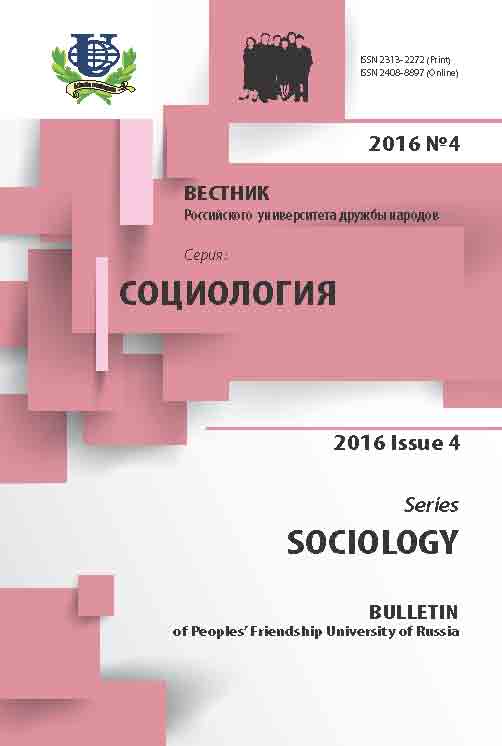Old markers of social stratification in the consumer society: A new role of education
- Authors: Mamedov AK1, Korkiya ED1, Malashonok SG1
-
Affiliations:
- Lomonosov Moscow State University
- Issue: Vol 16, No 4 (2016)
- Pages: 777-788
- Section: Contemporary society: the urgent issues and prospects for development
- URL: https://journals.rudn.ru/sociology/article/view/14810
- ID: 14810
Cite item
Full Text
Abstract
The article considers the fundamental transformation of the role of education as a value-forming element of the cultural field in the consumer society, provides a historical overview of consumer society theories, and outlines approaches to the study of education as a social-cultural phenomenon within the market economy. The authors apply the cultural sociology approach to identify patterns of educational services consumption that allows to broaden the methodology of social stratification research; consider the theory of social inequality and the principles of social stratification; identify causes of social instability and give estimates of social inequality in consumer society. Based on the works of foreign and Russian experts the authors analyze the institutional environment of social inequality (re)production: according to the results of numerous comparative studies the key such institution is the centralized system of institutional relations in the field of education. The article considers the categories of education and training, globalization and globalism in today’s society; main aspects of the consumer society development in Russia, especially the behavior of Russian consumers in the context of global consumer trends. Thus, the authors emphasize that the consumer society in general is destructive, self-focused, however, this is a vector of global development in the capitalist countries that is impossible to deny; we are to study its trends taking into account the historical aspects of consumerism and take adequate measures to normalize social life.
About the authors
A K Mamedov
Lomonosov Moscow State University
Author for correspondence.
Email: akmnauka@yandex.ru
Москва, Россия
E D Korkiya
Lomonosov Moscow State University
Email: ekakorkiya@mail.ru
Москва, Россия
S G Malashonok
Lomonosov Moscow State University
Email: sophie.malashonok@gmail.com
Москва, Россия
References
- Adorno T., Horkheimer M. Dialektika prosveshcheniya [Dialectic of Enlightenment]. M., SPb., 1997.
- Baudrillard J. Obshchestvo potrebleniya. Ego mify i struktury [The Consumer Society: Myths and Structures]. M., 2006.
- Baudrillard J. Sistema veshchey [The System of Objects]. M., 1995.
- Druker P. Postkapitalisticheskoye obshchestvo [Post-Capitalist Society]. Novaya industrialna-ya volna na Zapade. Pod red. V.L. Inozemtseva. M., 1999.
- Ivanova I. Potrebleniye obrazovatel'nykh uslug [Consumption of Educational Services]. Sara-tov, 2004.
- K obshchestvam znaniya: vsemirnyy doklad UNESCO [Towards the Knowledge Society: UNESCO World Report]. Paris, 2005.
- Korkiya E.D., Vasilyev A.V., Vasilyev D.A. Performans v sovremennom kulturnom pros-transtve: postmodernistskiy kontekst [Performance in the Contemporary Cultural Space: Postmodern Context]. Yakutsk, 2014.
- Korkiya E.D., Mamedov A.K. Standartizatsiya kak kontekst otchuzhdeniya sovremennogo “urban-society” [Standartization as a context of the alienation in the contemporary “urban-society”]. Teoreticheskiye i prikladnyye aspekty sovremennoy nauki. 2015. No.5.
- Mamedov A.K., Lipay T.P. Sotsialnaya stigmatizatsiya: sotsiokulturnyye aspekty [Social stig-matization: Social and cultural aspects]. Trud i sotsialnyye otnosheniya. 2008. No.11.
- Neklessa A.I. Epokha Postmoderna i novyy tsivilizatsionnyy kontekst [Postmodern Epoch and the New Civilizational Context]. M., 2008.
- Ortega y Gasset J. Missiya universiteta [Mission of the University]. Per. s isp. M.N. Golubevoy; red. per. A.M. Korbut; pod obsch. red. M.A. Gusakovskogo. Mn., 2005.
- Reich R. Trud natsiy. Gotovyas' k kapitalizmu XXI veka [The work of nations. Preparing for the XX century capitalism]. Novaya postindustrialnaya volna na Zapade. Pod red. V.L. Ino-zemtseva. M., 1999.
- Fromm E. Imet' ili byt' [To Have or to Be?]. M., 2000.
- Hobsbawm E. Epokha kraynostey: Korotkiy dvadtsatyy vek (1914-1991) [The Age of Ex-tremes: The Short Twentieth Century, 1914-1991]. M., 2004.
Supplementary files













